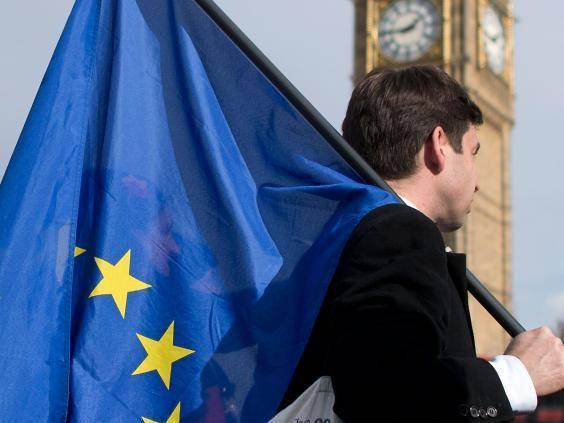If you want to see how Brexit will really pan out, take a look at what's happened to the European Capital of Culture
Five candidate cities have already spent up to £500,000 on their final bids, but on Thursday the UK’s access to the European Capital of Culture was pulled


Your support helps us to tell the story
From reproductive rights to climate change to Big Tech, The Independent is on the ground when the story is developing. Whether it's investigating the financials of Elon Musk's pro-Trump PAC or producing our latest documentary, 'The A Word', which shines a light on the American women fighting for reproductive rights, we know how important it is to parse out the facts from the messaging.
At such a critical moment in US history, we need reporters on the ground. Your donation allows us to keep sending journalists to speak to both sides of the story.
The Independent is trusted by Americans across the entire political spectrum. And unlike many other quality news outlets, we choose not to lock Americans out of our reporting and analysis with paywalls. We believe quality journalism should be available to everyone, paid for by those who can afford it.
Your support makes all the difference.There was a rare positive story about Brexit this week – the weakened pound had encouraged a surge in tourism, resulting in fewer UK hotel closures. It was the news equivalent of a back-handed compliment; when the day comes, staff for those hotels may be thin on the ground, and the flipside is British families downsizing their own holidays because of the squeeze on sterling. But hey, tourism is up so who cares?
Call me a Remoaner, but it feels like the letdowns keep on coming. To offset the not-altogether-positive hotel story, there’s the usual menu of Brexit blows to take your pick from – Europe’s plan to impose its own rules during the transition; questions over Gibraltar, 96 per cent of whose population voted Remain.
We also found out on Thursday that the UK’s access to the European Capital of Culture (ECoC) programme had been pulled – our next turn to host being 2023. Five candidate cities had already spent up to £500,000 on their final bids.
Described with unbridled creative optimism by The Telegraph’s Juliet Samuel as “a Brussels vanity project”, ECoC has existed since 1985. Set up to bring Europeans together, foster common culture and highlight richness and diversity, there’s a pot of arts funding available for the city that secures the win.
I don’t share Samuel’s disdain. Since 1985, Glasgow (1990) and Liverpool (2008) have both borne the title. Over the course of a year it had a transformative effect: breathing life into the post-industrial cities, encouraging arts participation, raising their international profiles, boosting tourism, improving the credibility of the cities’ creative sectors and changing overall perceptions of the cities, inside and out.
The Government expressed its “deep disappointment” – it wasn’t fair, their argument went, because other non-EU countries had been allowed to compete before! Theresa May, however, has pursued a path that takes Britain out of the EU as well as the EEA (EU countries plus Iceland, Liechtenstein and Norway), and membership of at least one of these is required for entry. No one can ignore the looming possibility of a hard Brexit.
The culture crowd saw this coming. Pre-referendum, the Creative Industries Federation’s (CIF) internal poll produced the same numbers as Gibraltar’s real-life vote. The survey coincided with an open letter signed by 300 high-profile creatives in support of the EU.
It would be altogether false to hail Brexit as the death knell for creativity, but our disqualification from ECoC – along with the loss of European arts funding in general – has implications for the creative sector.
ECoC isn’t about the cities which are already on the map as artistic destinations – it’s about realising the potential of cities which may have been overlooked. And as we miss out on a chance to showcase underrepresented cities, we’re missing out on a source of funds that can help us realise not just the chance, but the responsibility, of shining a light on underrepresented people.
In the overwhelmingly white and middle-class world of the arts in Britain, a loss of funding makes it more likely that marginalised creatives – female, working class, LGBT, black and minority ethnic or all of the above – will struggle to get the break they need.
The class divide in the arts is real, and without the ability to call on the bank of Mum and Dad, not everyone can do it for the love. And while the loss of funding will make it more difficult for these artists to get access and have their voices heard, Brexit is putting a dampener on cross-border collaboration too. Some of the best ideas occur where different cultures and experiences intersect – deputy Labour leader Tom Watson spoke of “cultural isolation”, and while that sounds dramatic, conceptual bridges are being burned.
If that sounds a bit too luvvy, money talks. ECoCs are a tremendous boon to the economy. In 2008 The Independent reported that since 1983 the number of visitors per year to Glasgow had jumped from tens of thousands to four million. Liverpool’s turn at being ECoC saw 9.7 million extra visits to the city. Of 2.6 million European and global visitors, 97 per cent of those were first-timers – and all of them boosted the economies of the places they came to. If you want to accept that “positive” Brexit story about boosted tourism, you have to accept the numbers here as well.
And it’s not just about what’s coming in. Looking at the bigger Brexit picture, Britain’s creative industries, worth £84.1bn, will lose access to their largest market.
As the Government undergoes “urgent” talks with the EU Commission on the decision, it may find that you can disagree with the rules, but you can’t necessarily change them.
Unlike the referendum that has led us here, the EU regulation which sets out conditions for entry to ECoC is legally binding. Allowing Britain’s access to carry on would be nothing short of a gift, and given the state of diplomatic relations, it’s unsurprising that the commission isn’t in a giving mood. As with other aspects of this sloppy negotiating process, the UK cannot have its cake and eat it.
Here’s a little story of hope. When the bid of my own area, Inverness and Highland, to be ECoC in 2008 failed, Scotland’s then First Minister was so impressed by the momentum built up that the year-long cultural celebration, Highland 2007, was born. I was a direct beneficiary – an arts group I was involved in secured funding which helped us transform the Christmas lights switch-on in my sleepy hometown of Nairn – population 11,000 – from the usual gaggle of carol singers into a huge parade the likes of which the place had never seen. It really did put Carnaby Street’s Christmas Carnival to shame.
Then there’s the well-established UK City of Culture, also inspired by ECoC. But in the face of relentless arts funding cuts, it’s hard to imagine another such scheme evolving in the same way.
Candidate cities have said they will keep calm and carry on implementing the plans they had in the run-up to 2023, with or without the dividends they might have received at the end. But what a shame the cultural sectors in those cities won’t be able to enjoy the combined power of both.
Join our commenting forum
Join thought-provoking conversations, follow other Independent readers and see their replies
Comments